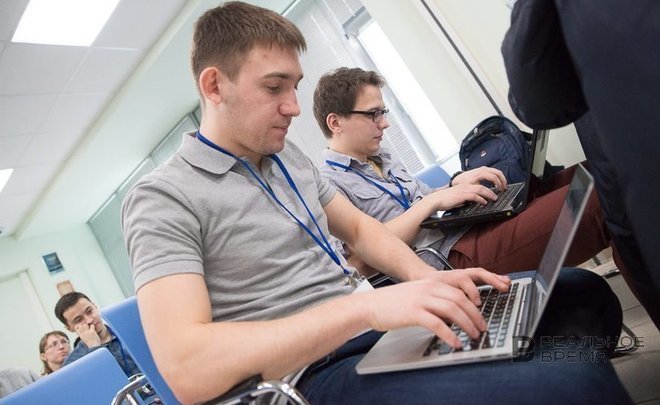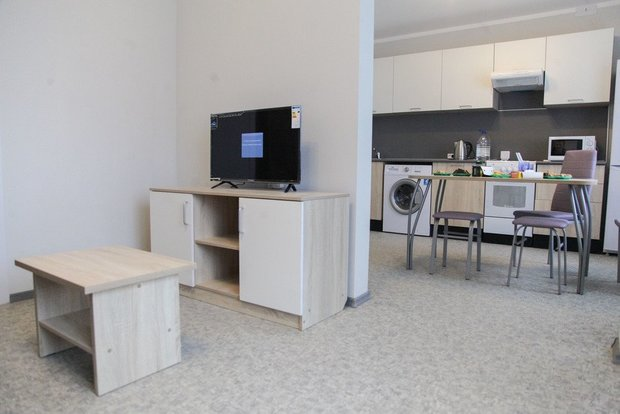‘The demand for the IT mortgage is abysmal’
A preferential programme designed to support the best minds in Russia turned out to be unnecessary for IT specialists

Realnoe Vremya’s analytic service found out that since the IT mortgage programme kicked off in Russia, just 1,700 loans for 15,2 billion rubles have been granted mainly in Moscow, Saint Petersburg and Moscow Oblast. Tatarstan specialists have borrowed only 601,9 million from banks. Experts think that IT specialists are considered one of the most mobile groups of the population, they don’t want to get tied to the home and overpay huge, including borrowed, money for it.
A preferential mortgage programme designed deliberately to retain IT specialists in the country was announced in Russia this May. In fact, it started operating in June but hasn’t anyway become popular among techies. As of 25 September, according to Dom.rf, IT mortgages have totalled just 15,2 billion rubles. To compare, the “Putin” preferential mortgage has surpassed 2,4 trillion rubles, the family mortgage has been 1,2 trillion rubles, and even the Far Eastern mortgage has turned out to be more attractive for Russians: loans for 170,4 billion rubles have been granted there.
Moreover, no such mortgage was granted in some Russian regions by early September. For instance, in the Republic of Sakha, Amur and Sakhalin oblasts as well as in Zabaikalsky Krai and Buryatia, the Far Eastern mortgage can explain this. For instance, zero loans are in Crimea, Sevastopol, Altai Krai, Khakassia, Ingushetia, Chechnya and the Republic of Tuva.

The top popular regions expectedly include Moscow, Saint Petersburg and Moscow Oblast. Tatarstan is fifth.
Leading regions in mortgages granted to IT specialists
REGION | LOANS ISSUES, MILLION RUBLES | |
1 | Moscow | 6,473,34 |
2 | Saint Petersburg | 2,436,77 |
3 | Moscow Oblast | 1,122,95 |
4 | Sverdlovsk Oblast | 673,56 |
5 | Republic of Tatarstan | 601,93 |
6 | Krasnodar Krai | 535,38 |
7 | Novosibirsk Oblast | 404,24 |
8 | Nizhny Novgorod Oblast | 279,55 |
9 | Perm Krai | 278,38 |
10 | Voronezh Oblast | 192,7 |
According to Dom.rf as of 25 September
1,700 IT mortgages at an average rate of 3,92% have been granted in Russia in general. The average first instalment was 18,69%.
According to Dom.rf, Ak Bars Bank from Tatarstan has issued IT mortgages for 36,69 million rubles. As Realnoe Vremya was clarified in the bank’s press service, 198 applications were received and 13 loans were issued in this programme from June to September. The peak of application submittal and loan issue was in June and September. The press service of Ak Bars Bank noted that they fixed a slight decline in demand and the number of applications in this programme at the moment.

The press service of Sberbank didn’t name the total number of IT mortgages issued in Tatarstan noting that their number “stabilised and was about 15 loans a month,” while the greatest demand was at the start of the programme earlier this year.
Managing Director of Mortgage at VTB in Tatarstan Guzel Moiseyeva noted that since the start of the programme VTB has issued Tatarstan IT specialists loans for 270 million rubles and it was popular among banks’ borrowers. Nevertheless, VTB doesn’t reveal the number of loans issued.
Leading banks in loans issued to IT specialists
BANK | LOANS ISSUED, MILLION RUBLES | |
1 | Sberbank | 6,210,88 |
2 | Dom.rf | 3,211,60 |
3 | VTB | 2,768,77 |
4 | Gazprombank | 1,025,78 |
5 | Alfa-bank | 744 |
According to Dom.rf as of 25 September
Ministry for Digital Technology, Communication and Mass Media wants to improve the terms
In mid-August, the Russian Ministry for Digital Technology, Communication and Mass Media cited a petition of representatives of the IT sector and offered to change the terms to get a preferential mortgage. As the press service said, the draft of the bill is already ready but the changes haven’t yet been adopted.
Key parameters offered by the ministry
- A rate of 3% instead of 5% a year;
- It is offered to lower the minimum salary for employees from 150 to 120,000 rubles for million cities (for Moscow given the high salaries, the requirements won’t change — 150,000 rubles) and from 100 to 70,000 rubles for other settlements.

At the same time, a salary not only in the main workplace but also part-time job can be counted if the second company was also authorised in the ministry.
- It is offered to change the age of the borrower “from 22 to 50 years” (instead of “from 22 to 44 years”);
- an IT specialist can work in an authorised company not demanding it to use tax concessions;
- one will have to work in such a company for at least five years since the loan issue date, then employment won’t be checked;
- when quitting the authorised company, the techie will have to find a job during six months (instead of three months like now).
As the ministry assumed, the changes will make the IT mortgage more affordable and allow covering a bigger number of specialists.
“The IT mortgage is needed for those who designed it to tick the box”
-
-

Maxim Osadchy Head of the Analytic Department of BCF bank
-
Techies are one of the most mobile groups of the population. They are more progressive, freely travel around the world, they aren’t tied to certain country, many of them can work remotely. Also, most of them are young and primarily well educated people who aren’t encumbered by property and often even a family, who don’t settle in a pace.
The most successful IT geeks are “people of the world,” cosmopolitans who are at home where they feel good. Amid increased geopolitical risks of Russia, they don’t want to invest in Russian real estate, including with such an instrument as mortgage. It is no surprise that there were a lot of techies in the first wave of the exodus from Russia after 24 February.
This is why no wonder that the demand for IT mortgage is abysmal.
-
-
-

Oleg Salmanov Editor-in-chief of Non-Digital Economy Telegram channel
-
IT is a profession that isn’t bound by a place. European countries introduced special visas for the so-called “digital nomads” — people willing to live in a country but working in another remotely — for a reason. This is why the idea of the mortgage for IT specialists that ties a person to the place of residence goes by some obsolete ideas. And in the current Russian conditions, it is especially strange for such “digital nomads” to be bound by financial liabilities that will be a senseless burden when leaving.
-
-
-

Yan Art Financial expert, member of the Commission for Banks and Banking Activity of the Russian Union of Industrialists and Entrepreneurs, candidate for economic sciences
-
When in Kazan, I go to a gym at Korston. And besides fitness I am provided a “benefit” there — a discount to a strip bar. So I go to Korston only when I am in Kazan and want to do sport. But if I am not in Kazan and do not want to do sport, no matter if I am given a discount to the strip bar or not, this won’t increase my desire to be in Kazan. The IT mortgage story is the same.
Here it isn’t even politics and an ideology. If an IT geek receives an interesting job proposal from another part of the globe, the person will anyway go there. The techies working here are, as a rule, people who earn well who either have already bought a house or have a mortgage, which probably is already coming to an and. And finally, if IT geeks rent a flat, maybe they haven’t simply decided what city they want to live in.
When this decision was made, I personally was very sceptic about it. It is like a classic marketing bonus we all can use but also can not use. But this bonus in fact never influences our decision and is needed for those who designed it to tick the box. For instance, I have private banking and an Infinity card and it includes some discounts in a super boutique on Stoleshnikovy Avenue. I have never been there over these 10 years I have been using this card. It is the same here.
Secondly, which is the same for Russia and IT geeks, people take out a mortgage not considering the interest rate like those who develop these programmes think and play with this rate but the total value of the house.
Real estate is very expensive in Russia in general. And each of us assesses how many millions can pay when starting to think about the mortgage. And only then they think that these five million will be given at 3% or 6%. If a person feels he/she cannot repay five million, you can offer them even 3% and others do 8%, they won’t take out it at 3%. And this is never understood in Russian. Therefore all changes in the rate, as a rule, don’t influence the mortgage activity. Another thing influences it — when there is a craze that everything will go up in price, people rush to buy right away.
The reality in Russia is so that not the rate stops us from making a decision to take out a mortgage or not.
-
-
-

Bulat Ganiyev Co-founder of Technocratia
-
A mortgage is taken out when one is confident about the future. Considering the special military operation, partial mobilisation and the flying meteorite, there is a deficit of the confidence about the future today. Many keep in mind that whatever can happen, there is why it is necessary to have cash in the pocket, not the title to the house that will have to be sold with a big discount if something doesn’t go according to plan.
What else can scotch this programme? firstly, an IT mortgage is issued only for new builds, that’s to say, it cannot be used to buy a second-hand flat and improve living conditions one day. This is done to support developers, first of all. But for an IT geek it means that you will get a flat in the future where many don’t rule out emigration. Moreover, many developers simply transferred benefits from preferential programmes to the flat value. And some 35-square-metre one-bedroom flat in an ordinary residential complex costs 8 million rubles.
Secondly, the cost of flat repairs seriously surged because many things are brought via unofficial channels with extra fees via intermediaries. It is hard to predict how many home improvement will really cost you. IT specialists can always easily go and work around the work without being tied to the country. Being tied with a mortgage to the country that is in a military conflict seems quite a risky idea for many.
-
-
-

Anastasia Gizatova Kazan realtor, head of Happy Home realty agency
-
The IT mortgage isn’t popular for several factors. Firstly, not all IT companies are authorised by the Ministry for Digital Technology, Communication and Mass Media, that’s to say, not all IT companies of Tatarstan are on the list of lucky employers whose employees can apply for such a mortgage.
Secondly, this mortgage applies only to new builds, and as a rule, it will be a dwelling that has not been delivered because small flats are grabbed by investors at early stages.
This is why it is unclear whom this preferential mortgage supports first of all — IT geeks or developers. An IT specialist cannot buy a ready flat in this programme, while construction companies can have a limited period of delivery. IT specialists have little choice, so to speak.
And one shouldn’t forget that IT specialists themselves are nomads who easily move from one place to another.
-
-
-

Albert Bikbov economist and blogger
-
The slavery-like mortgage is what immediately catches the eye. No, all this can be regarded as ordinary mortgage too, but here it is especially plain to see because of the specifics of programmers’ job, which is mostly divided into projects and isn’t long-term. The frequent change of work projects is a norm for a programmer. While the preferential mortgage ties to one place with one rule in its foundation — if an IT specialist quits and doesn’t find another one in three months, mandatorily in a company from the ministry’s registry, the mortgage rate can rise form a modest 4-5% to the key rate with 2,5-4% on top of that. And if a programmer isn’t lucky to find a job in the company from the registry, the worker will have to repay the rest of the mortgage on enslaving terms.
The freedom of choice of the place and working conditions, which is so important for a programmer, disappears. Also, to be honest, the 5% preferential rate almost doesn’t influence the choice of mortgage because the average value of the square metre is so high that the repayment of the principal amount of the mortgage becomes quite a hard task even for well-paid programmers.
But I will repeat that all these reflections have taken a back seat since the start of the special military operation in Ukraine. Today Her Majesty Total Uncertainty is reigning when everybody’s horizon of planning doesn’t go beyond a couple of weeks. And the mortgage is anyway a long-term project. And it is obviously not compatible with the current level of uncertainty.
-